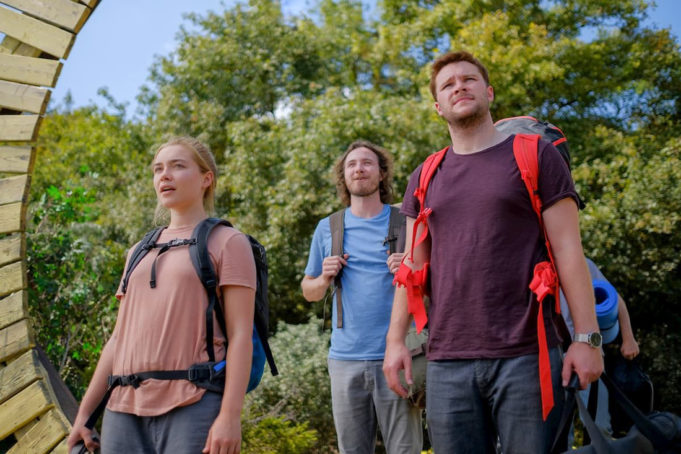The superbly creepy Midsommar starts, ironically enough, on a bleak winter night. Florence Pugh stars as Dani, an American psych grad student who becomes a nervous wreck when her bipolar sister emails her what looks like a suicide note. Dani’s longtime boyfriend Christian (Jack Reynor) and his friends all think she’s being overly dramatic. She isn’t — her sister has already murdered their parents and killed herself in the same stroke. Months later, when a Swedish student named Pelle (Vilhelm Blomgren) invites Christian and his fellow anthropology graduates (Will Poulter and William Jackson Harper) to his secluded rural hometown for its nine-day midsummer festival, a still-shattered Dani decides that she needs a getaway and tags along. The place looks like heaven, with maidens in flowing white dresses dancing barefoot in the grass. Unfortunately, the villagers are into spiking their guests’ food and drink with psychedelic substances and far more sinister stuff. Poor Dani will be freshly traumatized in ways she can’t imagine.
Writer-director Ari Aster made his debut last year with Hereditary, but fans of that film may well be surprised at how funny this follow-up is. The scene in which Christian breaks the news to his friends that Dani’s coming along on the trip is a dexterously executed exercise in deadpan comedy. Poulter is particularly funny, whether he’s bitching about Lyme disease, freaking out during a drug trip, or fantasizing about all the sex with hot Swedish babes that the trip has in store — regarding the last, he will get much more than he bargained for. Later on, after a scene of horrific violence, Pelle talks to Dani about Christian with dialogue that’s straight out of a romantic comedy. (“Do you feel held when you’re with him? Does he feel like home to you?”) In fact, this film is perhaps best viewed as an extremely twisted romantic comedy, with Dani starting to realize under the strain how badly matched she is with Christian. It is both risible and horrible how quick Christian is to abandon his friends to save himself.
Like Hereditary, this film is a visual triumph. Cinematographer Pawel Pogorzelski does wonders with the light in a place where the sun shines 22 hours a day during the solstice (the film was actually shot in Hungary), and production designer Henrik Svensson conjures some wondrous wooden sets like the communal hall where everyone sleeps, decorated inside with vibrantly colored tableaux depicting mysterious rituals. The yellow triangular building that serves as the village’s sacred temple is painted a vivid red inside with runic symbols festooning the walls. The movie’s final scene has Dani wearing a dress with flowers that’s so heavy that she can barely move, and it contributes to the memorable visual that ends the film.
Any filmmaker who can conjure scares in broad daylight wins my admiration, and Midsommar finds its horror not in monsters or demons lurking around the corner but rather in rituals deliberately playing out that you (and the film’s American tourists) only dimly understand, while the Swedish villagers weep in religious ecstasy. Aster does show us in gruesome detail what happens to a human body when it falls onto a rock from several hundred feet. Pugh, the short-statured English actress who starred in Fighting with My Family and Lady Macbeth, injects a rather astonishing amount of nuance into a role that has her either chemically altered or ugly crying or both for most of her screen time. I find the film’s ending more satisfying than I did with Hereditary, as Dani finds a way to extricate herself from her bad relationship, albeit in a most unusual way, with tears and flames and a lot of dead bodies. Some years ago, The Wicker Man was remade with Nicolas Cage screaming, “Not the bees!,” but Midsommar is the true heir to Robin Hardy’s 1974 horror classic, a pastoral idyll with ancient pagan blood sacrifices lurking underneath to clutch at our civilized hearts.
Starring Florence Pugh and Jack Reynor. Written and directed by Ari Aster. Rated R.












